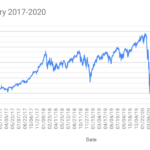Discover how government interventions are reshaping market dynamics and what it means for your investments.
- Viktor Shvets argues that traditional economic cycles are fading, leading to a ‘twilight’ world for investors.
- Government and central bank interventions have reshaped economic and capital-market cycles since the New Deal.
- Recent recessions have been milder, with average output contractions significantly lower than historical norms.
- Central banks now act as market participants, influencing capital flow through communication policies.
- Investors should focus on stocks with circular drivers and productivity potential, rather than traditional cyclical or value stocks.
In a thought-provoking analysis, Viktor Shvets, head of global desk strategy at Macquarie Capital, suggests that the traditional economic cycles we once knew may be a thing of the past. Instead of experiencing deep recessions followed by dramatic recoveries, Shvets believes that the economy now exists in a ‘twilight’ state, where fluctuations are less severe and more consistent. He points out that to find a true recession, one would have to look back to the period between the 1850s and 1930s, as recent downturns have seen much milder contractions in economic output. For instance, while historical recessions saw output shrink by about 20%, those since the 1950s have averaged closer to just 3%. The COVID-19 pandemic was an exception, but it also marked the shortest recession on record. nnShvets attributes this shift to significant government and central bank interventions, particularly since the New Deal era under President Franklin D. Roosevelt. He emphasizes that the government has taken on a more proactive role in managing the economy, akin to controlling the ‘weather’ rather than addressing the ‘climate.’ This has resulted in a cushioning effect during downturns, but it also means that recoveries are less robust. nnMoreover, Shvets highlights how central banks have transformed into active market participants, influencing capital flows through their communication strategies. This has led to a surplus of capital in the system, which helps mitigate economic downturns. nnFor investors, this evolving landscape means that traditional economic indicators may no longer be reliable. Despite some recession signals appearing, such as an inverted yield curve and a peak in the federal-funds rate, recent data shows strong GDP and job growth. Shvets advises investors to focus on stocks with strong productivity potential rather than traditional cyclical or value stocks, as the dynamics of the market continue to change rapidly. In this ‘twilight’ world, the investment strategy must adapt, with an emphasis on companies that can thrive in a disrupted environment.·
Image Credits: no
Factuality Level: 6
Factuality Justification: The article presents a theory from Viktor Shvets regarding economic cycles and government intervention, which is interesting but heavily opinion-based. While it provides some historical context and data, it lacks a balanced view and includes subjective interpretations of economic phenomena. The reliance on a single expert’s perspective without sufficient counterarguments or broader context affects its overall factuality.·
Noise Level: 8
Noise Justification: The article provides a thoughtful analysis of economic cycles and the impact of government and central bank interventions, supported by historical context and expert opinions. It discusses long-term trends and offers actionable insights for investors, while maintaining focus on the topic without irrelevant information.·
Private Companies: Macquarie Capital
Key People: Viktor Shvets (Head of Global Desk Strategy at Macquarie Capital), Franklin D. Roosevelt (President of the United States), Peter Drucker (Economist), Paul Volcker (Former Federal Reserve Chair), Alan Greenspan (Former Federal Reserve Chair), Jerome Powell (Federal Reserve Chair)
Financial Relevance: Yes
Financial Markets Impacted: Central banks and government policies impact financial markets
Financial Rating Justification: The article discusses the impact of central bank policies and government interventions on economic cycles, suggesting that this leads to milder recessions and recoveries. It also mentions the role of communication policy in dictating the flow of capital and how investors should adapt their strategies in this new ‘twilight’ world.
Presence Of Extreme Event: No
Nature Of Extreme Event: No
Impact Rating Of The Extreme Event: No
Extreme Rating Justification: The article discusses economic theories and trends but does not mention any extreme events that occurred in the last 48 hours.·
Move Size: No market move size mentioned.
Sector: All
Direction: Neutral
Magnitude: Small
Affected Instruments: Stocks
 www.marketwatch.com
www.marketwatch.com 




